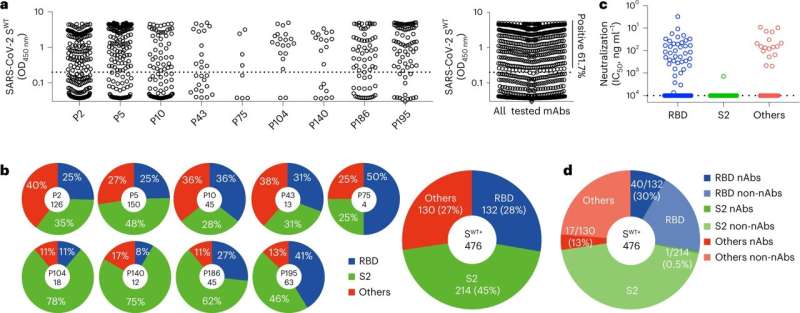This article has been reviewed according to Science X's editorial process and policies. Editors have highlighted the following attributes while ensuring the content's credibility:
fact-checked
peer-reviewed publication
trusted source
proofread
Unmasking the secret of broadly neutralizing COVID-19 therapeutic antibodies

The rapid evolution and emergence of new SARS-CoV-2 variants, such as the omicron variant, renders it highly capable of evading the host immunity.
At the same time, vaccines based on original wild-type strain of SARS CoV-2 shows reduced protection against newer variants, particularly for the omicron variant. This results in break-through infections among those vaccinated and highly infectious among non-vaccinated individuals.
Thus, it remains uncertain whether new emerging variants of the COVID-19 disease can escape the protective immune response triggered by vaccines and whether pre-existing antibodies present in patients who have recovered from COVID-19 can neutralize them.
To investigate, Associate Professor Justin Chu, Director of the Biosafety Level 3 (BSL-3) Core Facility and Associate Professor in the Department of Microbiology and Immunology, and Infectious Diseases Translational Research Program at the Yong Loo Lin School of Medicine, National University of Singapore (NUS Medicine), led a joint study conducted by the BSL-3 Core Facility and Tsinghua University in China, to discover how broadly neutralizing antibodies acquire their ability to neutralize all variants of SARS-CoV-2 tested. The study is published in Nature Immunology.
The researchers analyzed the unique features of broadly neutralizing antibodies present in nine individuals who had been infected with the original wild-type strain of the SARS CoV-2 virus. The neutralizing antibodies were isolated and studied.
A detailed analysis revealed that these antibodies have unique biochemical and structural features, which are naturally strong binders to the receptor binding domain on the virus surface, facilitating the uptake of the virus into human cells. Therefore, these antibodies are able to block the binding of the virus onto the surface of human cells, preventing infection of the human cells by the virus.
In laboratory studies, the neutralizing antibodies demonstrated protective effects. When tested with the beta variant, the neutralizing antibodies provide protection from severe disease outcomes and there were also no detectable levels of the virus in both the lung and brain tissues. Similar protective functions were also demonstrated using the omicron variant, resulting in no disease symptoms and no loss in weight.
These results highlight that a natural infection with the wild type of SARS-CoV-2 virus could generate broadly neutralizing and protective antibodies, which can protect individuals against infection from the omicron subvariants. In addition to the vaccine booster taken by past infected patients, it is highly likely that these antibodies contribute to hybrid immunity against the variants.
This study provides evidence to support the virus receptor protein in the antibodies as a viable and possible target for new vaccine strategies against the SARS-CoV-2 virus.
"The next part of our study aims to understand how the memory immune cells that produce these broadly neutralizing antibodies will be crucial for developing next generation vaccines, that can selectively enhance the production of such highly effective and broadly neutralizing antibodies," said Assoc. Prof. Chu, Principal Investigator of the study.
More information: Bin Ju et al, Infection with wild-type SARS-CoV-2 elicits broadly neutralizing and protective antibodies against omicron subvariants, Nature Immunology (2023). DOI: 10.1038/s41590-023-01449-6

















